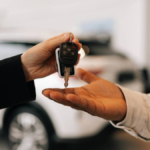Some people love having the latest gadgets in their vehicles and lucky for them J.D. Power analyzes the best new technologies that come to cars each year.
According to Kathleen Rizk, senior director of J.D. Power’s user experience benchmarking and technology, the company looks at about 40 new technologies every year in its U.S. Tech Experience Index study. The study analyzes the user experiences and any problems encountered with advanced technologies as they first enter the market. The results allow carmakers time to address any issues with the technologies early on before there’s mass adoption.
Rizk said there are about 80,000 participants in the study. All of the participants are new-vehicle owners, and they’re quizzed at 90 days of ownership. Some of the technology they study is still in the emerging stage and not broadly adopted yet, she said.
“So only people who have the technology today can respond because we know that everybody wants a bunch of technologies, but these are people who actually have experience with them,” Rizk said.
Below are the top five ranked technologies from 2024 across all powertrains ranked by Rizk in terms of usefulness.
Rizk said most consumers found blind spot cameras — a technology first introduced several years ago — to be the most useful of newer technologies. It provides a view of the next lane’s blind spot area when the driver activates the turn signal to change lanes.
“So if you put your blinker on to go left, it shows you a complete camara view of what’s happening in that left lane, including in your blind spot area,” Rizk said.
Some vehicles’ blind spot camera technology will also give drivers a blind spot notification in the mirror if another object is in the driver’s blind spot area, and some even have blind spot intervention — technology that will actually pull you back if you’re trying to change lanes and another vehicle is in the blind spot area, Rizk said.
“What we find happens with technologies that solve a known issue — and we know we have a known issue when we’re changing lanes or we’re backing up — those technologies really resonate with consumers,” Rizk said. “So this is the number one technology of these more advanced technologies.”
She said it is available on many vehicles made by: General Motors, Hyundai, Kia, Genesis, Tesla and Rivian.
J.D. Power does not look at the pricing of these technologies because of the many different ways they’re packaged.
Also, Rizk added, “There are different executions of it, so those executed in the instrument cluster perform better than those that execute it in the infotainment center. It’s just a bit more unnatural to look in the infotainment system when you change lanes. It’s still a bit more natural in the cluster because you’re used to looking in the left mirror or the right mirror. The cluster execution resonates better with consumers.”
Consumer auto surveys: Subaru tops customer satisfaction survey as Toyota falls, Stellantis brands occupy bottom
The next is Smart Climate Control, a convenience feature more than a safety feature.
Smart Climate Control is new technology that J.D. Power started tracking in 2024. Rizk said it’s on many German-made vehicles and will be coming in other vehicles soon.
“It uses AI to automatically detect areas in the cabin that are hot or cold,” Rizk said. “So let’s say you have the sun beating through the passenger window — the systems don’t all operate identically — but it will change the vent flow and aim it at that area.”
Smart Climate Control can turn the fan speed up or down, adjust the temperature to cool or heat parts of the cabin automatically based on what it senses in the environment, she said.
“Consumers here in the U.S. don’t really like the auto feature … it’s a polarizing feature,” Rizk said. “Some want to turn the fan speed on high even if it’s not hot yet, instead of auto cooling or heating the cabin. This is kind of the next generation of it because it’s controlling not just the set temperature, but it’s determining what the set temperature should be to keep that cabin at your ideal temperature based on learnings.”
Over-the-air updates are being offered by nearly all manufacturers now, and most consumers love this feature, Rizk said. But there are issues with it at times because it might take too long to download, or consumers might not know what’s being updated. But in general, she said, the idea that a car owner can keep their vehicle up-to-date, especially since so much of the vehicle runs on software, without having to go to a dealership for service, is something consumers view as beneficial.
“Tesla was the first one with this feature, and as we’re moving more to software-defined vehicles, this is going to become even more critical,” Rizk said. “The (automakers) will not only be updating software, they’re going to be adding new features to your car.”
A software-designed vehicle is one that is engineered where a lot of its operating system depends on software, she said. The more complex the vehicles get, there will be features that only automakers can change, which is why over-the-air updates are so convenient for car owners.
“So if you’re getting a Mercedes with Level 3 autonomy…that hardware and software is on that vehicle already, and they can flip that on, right? Or they could throw out a new feature that isn’t even on there yet, but it’s a software feature that could be added to the car,” Rizk said. “Ultimately, we’ll get to the point where companies other than the vehicle manufacturer could add software to the vehicles.”
Tesla was the first with the smart doors feature. How it works is, when the owner approaches the vehicle, the doors can open automatically without the person touching the door handle. This means it goes well beyond just unlocking the doors.
“This feature opens the doors, and in some executions, like in a Genisys or Mercedes vehicle, the doors can automatically close. So once you’re inside, there could be a button on the armrest, you could press the brake, you could use voice control and say, ‘close the doors’ and they close,” Rizk said. “So you don’t have to physically close the doors shut.”
She said the opening feature is already on certain model Teslas and BMWs, the Cadillac Escalade and some Lexus vehicles. The closing portion is mostly on certain Mercedes and Genesis models.
But it still has some glitches, Rizk said.
“It doesn’t always open when they approach the vehicle, or it doesn’t open fully and it takes too long,” Rizk said. “But in general, it’s a pretty well-received feature even though it does have some problems. People still like the idea of not having to pull the door open, especially if your hands are full, and not having to pull that door closed.”
A phone-based digital key unlocks the door and starts your car.
“This is not remote. This is a very different feature than remote. This is using your phone as a key fob,” Riz said. “So just having your phone on you, you approach the car, it’s going to unlock, you get in the car, you press the brake and hit the start button.”
Rizk said once the phone-based digital key is set up, the person does not need to go into any app. But, like all technologies, each manufacturer executes it differently. Rizk said, for example, in a Hyundai vehicle, the driver has to pull out their phone and put it to the door handle to get inside, then once inside the car, the phone has to be in the wireless charger before the driver can push the start button to start the vehicle.
“In other executions, you can just have it on you like a key fob and you don’t have to do anything,” Rizk said. “It’s identical to a key fob, but it uses the smartphone and that’s what people want, that smartphone experience.”
The benefit it offers is it allows a driver to share a key, so to speak.
“If you wanted to give your son or daughter access to the car without a physical key, you could just send it remotely through your smartphone to them, assuming they also have the app and they can drive the car,” Rizk said. “This has become very popular this feature in the last few years, and almost all manufacturers are starting to offer it.”
She said it’s popular because people like the flexibility in managing access with their smartphone and, while you might leave your key behind, nobody ever leaves their phone behind.
Rizk said there are concerns around hacking with some of the features but, “I’ve never heard of it having problems and vehicle manufacturers have put security around this. But there is some perception with some consumers around that.”
Jamie L. LaReau is the senior autos writer who covers Ford Motor Co. for the Detroit Free Press. Contact Jamie at jlareau@freepress.com. Follow her on Twitter @jlareauan. To sign up for our autos newsletter. Become a subscriber.












